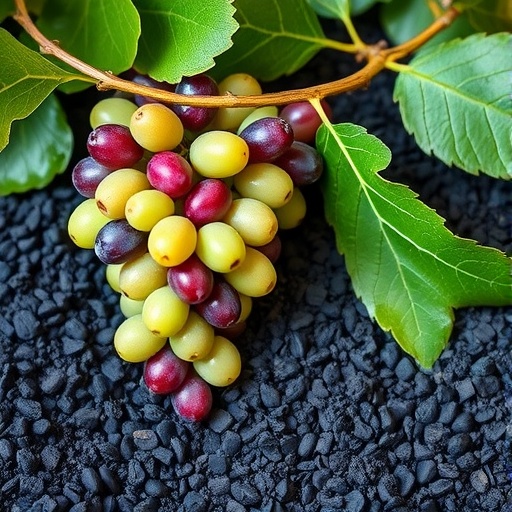In an innovative approach to sustainable infrastructure, a groundbreaking study has illuminated a unique opportunity inherent in agricultural waste. The study, conducted by Zhang et al., investigates the potential of repurposing grape and olive pomaces—by-products of the wine and olive oil industries—into bio-renewable antioxidants that can enhance the quality and longevity of asphalt paving materials. As urbanization accelerates globally, the demand for sustainable construction materials is becoming increasingly urgent, highlighting the importance of integrating circular economy principles into traditional manufacturing processes.
Grape and olive pomaces constitute significant volumes of waste, presenting a dual problem of environmental disposal and underutilization of resources. Traditionally discarded, these pomaces are rich in phenolic compounds known for their antioxidant properties. The study meticulously explores how these natural antioxidants can be harnessed to improve the durability and performance of asphalt. By effectively transforming waste into a valuable resource, this research not only addresses environmental concerns but also contributes to innovative solutions for sustainable construction.
The unique properties of phenolic compounds in the pomaces make them ideal candidates for enhancing asphalt’s resistance to oxidative aging and environmental stressors. Asphalt, being a petroleum-based product, is inherently susceptible to degradation from UV radiation and thermal cycling. The introduction of grape and olive pomaces into asphalt formulations could lead to a significant reduction in the rate of deterioration, enhancing the longevity of roads and pavements and reducing the frequency of repairs—a substantial financial saving for municipalities and governments.
Through a series of rigorous experimental analyses, the researchers established a correlation between the concentration of pomaces used and the resulting performance metrics of the modified asphalt. The study utilized advanced characterization techniques to assess the mechanical and compositional properties of the asphalt blends. The findings showed that even modest amounts of grape and olive pomaces significantly improved the physical properties of the asphalt, leading to superior performance in terms of elasticity, ductility, and resistance to thermal cracking.
In addition to enhancing asphalt durability, the study also delves into the potential economic advantages of incorporating agricultural waste into asphalt production. By tapping into the abundant supply of grape and olive pomaces, which are often viewed as a burden by producers in the food industry, the construction sector could benefit from lower material costs. Moreover, using these waste materials aligns with the principles of a circular economy, which promotes minimizing waste and maximizing resource efficiency.
As infrastructure projects around the globe face increasing scrutiny over sustainability practices, integrating bio-renewable antioxidants into asphalt mixtures presents an attractive solution. The research emphasizes not just the technical feasibility but also the societal advantages of such innovations. By adopting alternative materials, the lifespan of road infrastructure could be extended, potentially leading to less frequent and less resource-intensive maintenance, thus alleviating pressure on environmental resources.
The implementation of these findings could have far-reaching implications in regions where grape and olive production is prevalent. Countries with significant wine and olive oil production—such as Italy, Spain, and Greece—could witness a transformative shift in waste management practices, converting a problematic by-product into a valuable material for construction. In this light, the authors of the study emphasize the importance of interdisciplinary partnerships between agriculture and civil engineering, signaling a new era in sustainable practices.
Beyond just economic and environmental benefits, the research also opens the door for enhanced public understanding and engagement with sustainable materials. The shift towards greener construction practices has the potential to change perceptions of infrastructure development, making it more palatable to communities concerned about ecological impacts. By promoting transparency and engagement, stakeholders can foster a greater appreciation for innovative practices that prioritize the health of the planet.
However, while the results are promising, the researchers caution against prematurely adopting the technology without thorough field testing and regulatory assessments. Such considerations are crucial for ensuring that the long-term performance of asphalt incorporated with bio-renewable antioxidants meets industry standards. Future research will undoubtedly be needed to refine processing techniques and assess the scalability of using grape and olive pomaces within commercial asphalt production.
In the context of ongoing climate change challenges, this study is a timely reminder of the potential locked within agricultural waste. It serves as a model for other sectors looking to innovate using valuable by-products that are often overlooked. As we globally face the dual challenges of waste management and sustainable development, research like this one led by Zhang and colleagues could catalyze similar initiatives aimed at turning waste into wealth.
In conclusion, the repurposing of grape and olive pomaces into bio-renewable antioxidants for asphalt paving materials represents a significant advance in sustainable construction practices. This research not only showcases the feasibility of integrating waste into material science but also offers a blueprint for future innovations in the field. As the drive for sustainability intensifies, the lessons gleaned from this study could inspire a broader movement toward the incorporation of renewable resources across various industries.
In summary, the study presents a unique intersection of food waste management and construction materials science, advocating for a holistic approach to fostering ecological balance within infrastructure development. With continued exploration and collaboration across disciplines, there is great potential for cultivating a more sustainable future through the innovative use of bio-renewable materials.
Subject of Research: Repurposing agricultural waste as antioxidants in asphalt paving.
Article Title: Repurpose Grape and Olive Pomaces as Bio-Renewable Antioxidants for Asphalt Paving Materials.
Article References:
Zhang, K., Zhu, Y., Lowenhar, S.P. et al. Repurpose Grape and Olive Pomaces as Bio-Renewable Antioxidants for Asphalt Paving Materials. Waste Biomass Valor (2025). https://doi.org/10.1007/s12649-025-03312-1
Image Credits: AI Generated
DOI: 10.1007/s12649-025-03312-1
Keywords: Sustainable construction, agricultural waste, asphalt, bio-renewable materials, antioxidants.
Tags: agricultural waste repurposingasphalt paving materialsbio-renewable antioxidantscircular economy principlesenhancing asphalt durabilityenvironmental disposal solutionsgrape and olive pomacesinnovative construction materialsphenolic compounds in constructionreducing industrial wastesustainable infrastructureurbanization and sustainability





